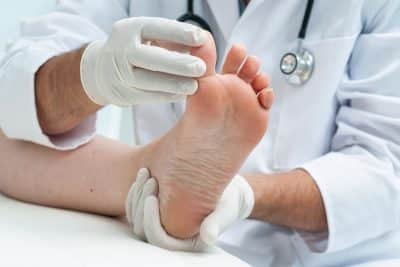Athlete’s Foot
Athlete’s foot is a common fungal infection that affects millions of people worldwide. Despite its name, this condition can affect anyone, not just athletes.
Symptoms
- Athlete’s foot, also known as tinea pedis, is caused by a group of fungi known as dermatophytes. These fungi thrive in warm and moist environments, making the feet an ideal breeding ground. The symptoms of athlete’s foot can vary from person to person but often include:
- Itching: The most common symptom is intense itching, often between the toes. It can be uncomfortable and distracting, leading to scratching, which may exacerbate the condition.
- Redness and Inflammation: The skin between the toes or on the soles may become red and swollen. In severe cases, blisters or open sores can develop.
- Peeling and Cracking: Affected skin may peel, flake, or crack, which can be painful and cause discomfort when walking or standing.
- Burning Sensation: Some individuals report a burning sensation on the infected area.
- Foul Odor: an unpleasant odor due to the fungal infection and the accumulation of sweat can occur.
Types of Athlete’s Foot
There are three common types:
- Interdigital Athlete’s Foot: This type typically occurs between the toes, causing itching and often leading to painful cracks and blisters.
- Moccasin Athlete’s Foot: This form results in a scaly, thickened, and dry appearance on the soles of the feet, which can extend to the sides.
- Vesicular Athlete’s Foot: This type presents as fluid-filled blisters on the feet and is often accompanied by intense itching.
Treatments
The good news is that athlete’s foot is treatable, and several options are available to combat this fungal infection:
- Over-the-Counter (OTC) Medications: Antifungal creams, sprays, or powders are readily available at most drugstores. These OTC treatments can be effective for mild cases.
- Prescription Medications: In cases of severe or persistent athlete’s foot, a podiatrist or healthcare provider may prescribe stronger antifungal medications. These can be in the form of oral medications or topical creams.
- Home Remedies: Keeping your feet clean and dry is essential. Washing your feet daily, changing socks and shoes regularly, and using antifungal powders can help prevent the infection from returning.
- Foot Hygiene: Maintaining proper foot hygiene can aid in preventing athlete’s foot. Be sure to keep your feet dry, especially between the toes, and avoid walking barefoot in public places like locker rooms and communal showers.
How Sunrise Podiatry Can Help
If you’re suffering from athlete’s foot and seeking professional care, Sunrise Podiatry in Broward County, Florida, is your trusted partner in foot and ankle health. Our expert team of podiatrists is well-versed in diagnosing and treating various foot and ankle conditions.
Sunrise Podiatry offers personalized treatment plans to address your specific needs. Our experienced podiatrists will assess the severity of your athlete’s foot and recommend the most appropriate treatment, which may include prescription medications, advice on proper foot hygiene, and prevention strategies.
One noteworthy advantage of choosing Sunrise Podiatry is access to the cutting-edge PinPointe laser machine for nail fungus treatment. While primarily designed for nail fungus, this state-of-the-art technology can be used for athlete’s foot as well. The PinPointe laser is a safe and effective option for those seeking a minimally invasive, quick, and comfortable solution to fungal infections.
Athlete’s foot can be an uncomfortable and persistent condition, but it’s highly treatable with the right care. Sunrise Podiatry is dedicated to providing expert foot and ankle care, with a team of experienced podiatrists and advanced treatment options, including the PinPointe laser machine. Don’t let athlete’s foot disrupt your life; contact Sunrise Podiatry for effective treatment and a path to healthier, happier feet.


